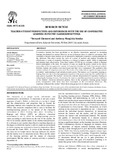TEACHER-STUDENT PERSPECTIVES AND EXPERIENCES WITH THE USE OF COOPERATIVE LEARNING IN POETRY CLASSROOM SETTINGS
Abstract
Cooperative learning has been proclaimed as an effective instructional approach in promoting
language development in learners. However, its use in Kenyan schools is relatively uncommon. This
seemingly is because many teachers are not prepared to implement cooperative learning principles in
the classroom. This article reports the views of a group of teachers and students regarding the
effectiveness of using of cooperative learning as a strategy to improve pupils’ ability to understand
and interpret high school poetry. Form three students (N-199) in six secondary schools in Baringo
district participated in the study. Six teachers of same sex taught the poetry content in the classes
using either of the two approaches, namely 1) Cooperative learning and 2) the Conventional method.
Selected students and teachers were interviewed and their views summarized. The qualitative data
analysis methods of comparison were used. The results of the study indicate significant improvements
in students’ understanding of and attitudes towards poetry. The learners saw Cooperative learning as
helping them not only to develop appropriate responses to the given poems but also enabled them to
enjoy poetry in general. The teachers’ version also indicates the potential of Cooperative learning in
enhancing the learning of poetry. For instance the study revealed that apart from its positive influence
on the students’ classroom interaction patterns, those in the cooperative learning groups learned
poetry interpretation skills better than their counterparts in the conventional classrooms. The
experience influenced the teachers’ belief about using group work to enhance poetry lessons.

